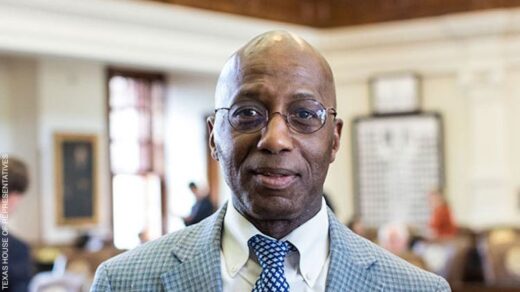Any Gay With a Lisp Has a Hero in Biden and Amanda Gorman
I used to be pulled out of classes during my early grade school years, between second and sixth grades. It wasn’t because I had misbehaved, although it certainly felt that I had done something wrong. I would be sitting quietly in a classroom, listening to the nuns teaching their lessons, when the quiet was interrupted by a woman who would knock and then open the door, and blurt out, “Excuse me Sister, but John Casey, it’s time for your speech lesson.”
And then the torment began. As I gathered my books, and walked quickly toward the door, I heard the cruelty of my classmates who, under their breaths, would hiss a long “s” sound and snicker at the way I spoke.
I had a pronounced lisp as a little boy, and I still have a very slight one if you listen closely. I speak quickly and loudly, with a deep voice, so it might be hard to catch. When I’m tired, or have had a few drinks, I can sense my “S’s” slipping slightly, slowly and self-consciously out — this statement written purposely, spoken out loud as I wrote it, reminding me of the horror and vulnerability I still experience when I have to utter words riddled with “S’s.” Or when I hear someone else with a lisp.
Our newly-elected president Joe Biden must feel the same way when he hears someone stutter. President Biden has dealt with a stutter, in very personal terms because that’s the only way it can be dealt with, most of his life. He stuttered, somewhat noticeably during the presidential debate in Detroit last year. They weren’t Biden’s famous gaffes — easily confused because a stutter can imply that you’re stalling as if you don’t know what you’re going to say next — it was, and is, Biden’s Achilles heel. Biden gave a gripping interview about his boyhood stutter to The Atlantic’s John Hendrickson, who also stutters. They shared their stories about dealing with, and working to overcome, a speech impediment.
We know Biden feels empathy for anyone who has suffered the indignity of not speaking correctly — or the way society expects everyone to speak, which is perfectly. As if there is some magic way that we all are supposed to speak. How was that ever made into an arbiter of normalcy?
Biden, on the campaign trail, befriended a young man, whose vulnerability about stuttering was palpable, and Biden’s concern and advice to him was heart tugging and emotional. That boy, 13 year-old Brayden Harrington, who bonded with Biden over their shared experience with stuttering, bravely spoke at the president’s inauguration on Wednesday.
Harrington wasn’t the only one with a speech impediment history who spoke at the inauguration. Amanda Gorman, the 22-year-old Youth Poet Laureate whose rising words belied little in the way of problematic annunciation, also shares a commonality with Biden, Harrington, and me. She’s been dealing with a speech impediment, as recently as a few years ago. She told CNN’s Anderson Cooper that she struggled with the “R” sound and overcame it with the help of the Tony-winning Hamilton.
“It was as recent as college that I was still struggling to say the ‘R’ sound, and so one thing that I would do to try to train myself to say it, is I would listen to the song ‘Aaron Burr, Sir,’ which is just packed with R’s,” she explained to Cooper.
I have never spoken about the shame I felt about my speech, my lisp, and I have really tried to block it out of my mind most of my life. And now, I’m wondering, why was there so much fuss about it? When Biden’s story with Harrington made news, it brought a tear to my eye, and allowed me to think about, really for the first time as an adult, what it was like during those gruesome days of being disgracefully pulled out of class to go and fake my non-lisp, because that’s what I did, but not at first.
There was a small book that I had to read from. The speech instructor made me read sentences from that tome that consisted of a string of words with “S’s,” “Sally sells seashells by the seashore,” as if reading those phrases, with a lisp was abhorrently wrong. That’s what my young heart was led to believe, because, when I left that room, left that instructor, and left that little book, I went into a cruel world where lisping meant you were effeminate.
And I carried that lisp through grade school and high school and did so in the face of those who were paying attention, and picked up on it, and then went in for the kill, taunting me by over-the-top lisping their “S’s,” and flipping their wrists up and down. They were basically saying and intoning that I was less than a man, “Gaysey” instead of Casey, because my “S’s” didn’t sound like theirs. The satire that I was a “sissy” did not escape me. It left a huge scar. I remember the torment and the pain it caused, and I remember how absolutely awful I felt about myself and the way I talked.
I don’t have a story about heroically overcoming the lisp. I still reel when confronted with saying words laden with “S’s,” but I must have just pushed over it fiercely, because I nevertheless was popular in grade school, high school, and college. I went on to become a public relations executive, a corporate spokesperson, and a college professor. A communicator. Ironic since my seeming inability to communicate correctly when I was younger was so profound.
As an adult, I have advised companies, corporate executives, scientists, celebrities, athletes, and a full gamut of brands and persons about how to communicate effectively. And thinking back on getting pulled out of those classes in someone’s vain attempt to get me to communicate correctly, I had my own way of sneaking, succeeding, and sliding by an unsuspecting speech soothsayer. I finally learned the trick to escape that lisping sentence — figuratively and literally.
I had a secret, and I’m disclosing it now. I realized at some point that all I needed to do was grit my teeth at every “s,” so that instead of those “S’s” slipping out, they came out hard — really hard. And, after repeatedly doing this, those lessons eventually went away. Clamping my teeth clamped the chatter that I couldn’t prattle perfectly.
I was biting my teeth in an attempt to get past having to suffer the mortification of speech therapy, and perhaps gritting them because of a subconscious anger about the way I spoke, the way it made me be perceived as less than a man, and made me feel like less than a human being. I still grit my teeth, but it’s for different reasons now; however, there are times, when I do, I think about those days of being pulled out of class, and the pain and disgrace that I felt because I had to grit my teeth to survive.
Watching Biden, Harrington and Gorman speak so effortlessly and confidently yesterday made me feel, for the first time in my life, proud that I had, and continue to have a lisp. My slow “S’s” are a badge of honor. There’s no shame in not gritting my teeth. Sally can keep selling those seashells by the seashore, and I’ll keep slightly slithering out my slippery “S’s.”
John Casey is editor at large for The Advocate.
Original Article on The Advocate
Author: John Casey





